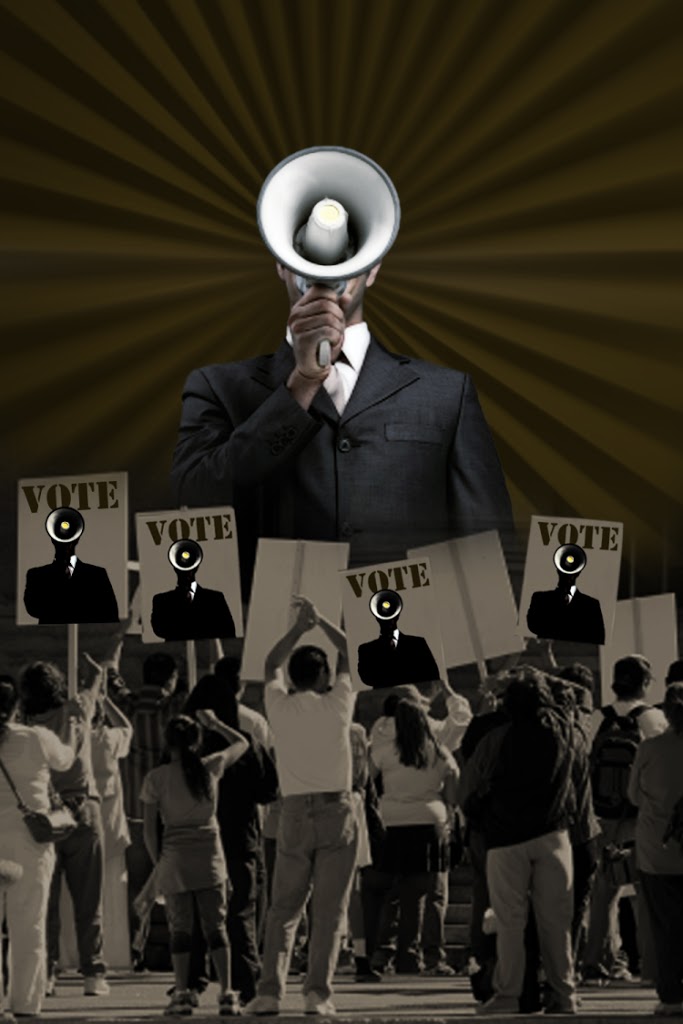By Lida Prypchan
“Politics is the art of preventing people from getting involved in what concerns them.” Valéry
Political propaganda has been inspired by and has taken from poetry many of its procedures: the seduction of rhythm, the prestige of the verb, the violence of images, and dramatic progression. It has also created rationally managed artifices, like poison, to excite fear or hope. The end, as you can see, resembles a seductive and flirtatious woman and not a giant robot, which is to say, the goal of propaganda seems more poetic than political. The purpose is to make the people dream of the past’s grandeur and a better tomorrow. This reminds me of a song that says: “I was dreaming that my mother-in-law had died and when I arose I began to cry, but not from remorse, but rather for having realized that I was daydreaming.” So are we with respect to politics: daydreaming; the propaganda agencies and the political parties treat us like the mentally weak, like true newborns who sleepwalk when we grow up. You have to be an idiot to believe that corruption is going to end in this country, or at least during the next five years, whoever wins. Gentlemen, the problem lies in our idiosyncrasy which includes taking the easy way out, cunning as a means of achieving jobs, waste, an excess of projects and an absence of deeds, the cult of drinking, the myth of machismo, the contempt for study and effort, the unwillingness to work, the lack of national identity, the cult of pleasure, and the tranquil life without aspirations! Why look for more reasons for national laziness? Blame it on the Spanish, the Indians, the climate, or education.
The fault is ours. I have seen arid countries that are converted through work into fruitful lands.
Political propaganda has a number of rules and specific techniques, these are: 1) The Rule of Simplification, 2) the Rule of Exaggeration and Distortion, 3) the Rule of Orchestration, 4) the Rule of Transfusion, and 5) the Rule of Unanimity and Contagion. The foundation of these rules is to convince and persuade, and not to cause thinking or deciding or providing solutions by participating, as it should be in a democracy. By propaganda we always understand a type of intellectual stuffing up, against which we justly rebel. In order to be considered well conducted and legitimate, political propaganda should be content to show the postures and attitudes of its candidates and allow the lively participation of the masses in the democratic life of the Nation.
But it would also be necessary for the people to be involved in the construction of their future and not only in electoral disputes.
Now, let us get back to the rules and techniques. 1) The Rule of Simplification: In a campaign you have to achieve simplicity. No long demonstrations of ability; clear formulas are required. AD says: YES, say YES to your country. Copei says: All of Venezuela needs Caldera, adding in another advertisement: for a candidate who does not want debates, MI. 2) Rule of Exaggeration and Distortion: The lie of corruption, promises. And all these lies and minute-long speeches should be in ultra-simple language, so that the lie is understood by the most uneducated to the most educated. Apart from the lies, they exaggerate facts: AD exaggerates the errors of the current government; COPEI exaggerates with the promise of a million jobs, but, in my opinion, did not exaggerate when speaking of the squandering and the megalomania of CAP, which inspired Sanin to write his book “Saudi Venezuela”. 3) The Rule of Orchestration: The first condition for good propaganda is the incessant repetition of the principal themes or the central theme of the party, which must be presented from different aspects. Do not forget that propaganda should not contradict itself: the propagandist, and therefore the candidate, is limited to keeping silent on those points where he/she is weak. And in this respect, Dr. Lusinchi committed three errors. First, feeling himself cornered in the debate against Dr. Caldera, he used the weapon of irony that, as is well known, is a manifestation of fear and cowardice.
Second mistake: when they challenged him to another debate, he lost his nerve, exposing his insecurity and his fear to express his views, perhaps due to lack of knowledge or perhaps lack of criteria. Third mistake: presenting propaganda explaining why he did not accept Dr. Caldera’s challenge.
Now he is trying to deny the image that he himself created. This tactic lacks force because it is very difficult to deny something without appearing defensive. 4) Rule of Transfusion: Propaganda does not start from scratch. The political chief appeals firstly to the sentiment of the crowd. 5) The Rule of Unanimity and Contagion: from the beginnings of sociology, group pressure and the multiple conformities that societies give birth to have been used on individual opinion … It is always about creating a feeling full of exaggeration, fantasy, and euphoria coupled with another feeling of vague fear. And this, helped by the individual’s instinct to share views with the people that surround him, is a very auspicious atmosphere for the persuasive techniques of political propaganda.

